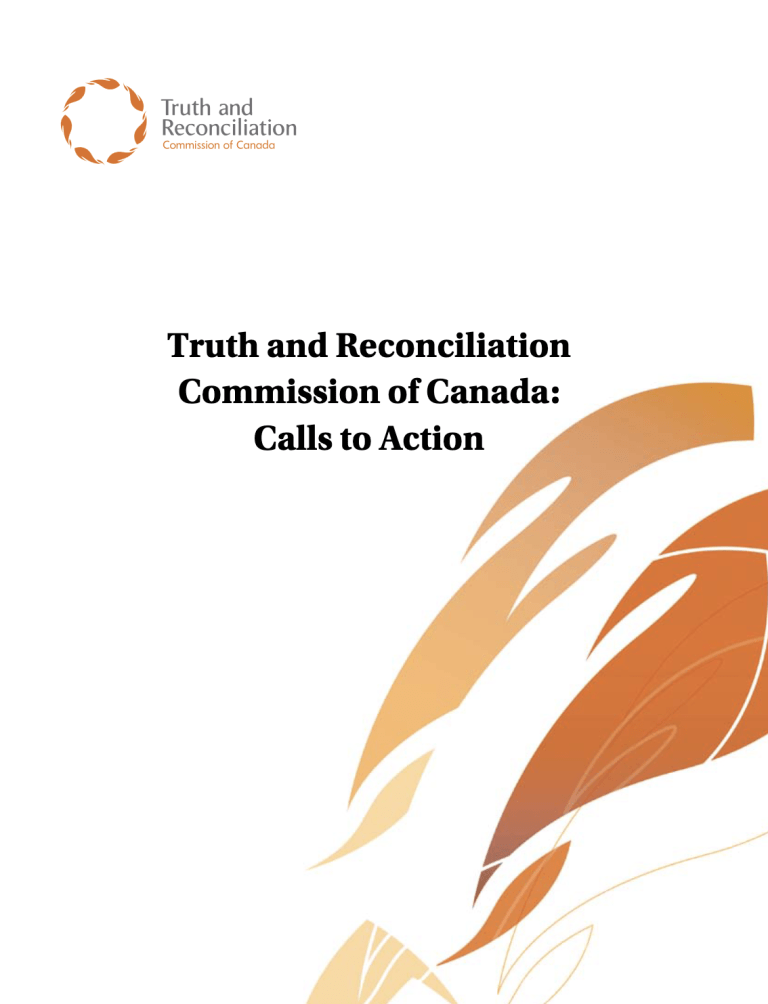40 search results
for
Indigenous rights and self-governance
Reconciliation
Museums and archives
Recommendation 68: We call upon the federal government, in collaboration with Aboriginal peoples, and the Canadian Museums Association to mark the 150th anniversary of Canadian Confederation in 2017 by establishing a dedicated national funding program for commemoration projects on the theme of reconciliation.-
Category and theme:
Groups affected:
Location of recommendation:
Reconciliation
Museums and archives
Recommendation 69: We call upon Library and Archives Canada to:- Fully adopt and implement the United Nations Declaration on the Rights of Indigenous Peoples and the United Nations Joinet-Orentlicher Principles, as related to Aboriginal peoples’ inalienable right to know the truth about what happened and why, with regard to human rights violations committed against them in the residential schools.
- Ensure that its record holdings related to residential schools are accessible to the public.
- Commit more resources to its public education materials and programming on residential schools.
-
Category and theme:
Audience:
Groups affected:
Location of recommendation:
Reconciliation
Museums and archives
Recommendation 70: We call upon the federal government to provide funding to the Canadian Association of Archivists to undertake, in collaboration with Aboriginal peoples, a national review of archival policies and best practices to:- Determine the level of compliance with the United Nations Declaration on the Rights of Indigenous Peoples and the United Nations Joinet-Orentlicher Principles, as related to Aboriginal peoples’ inalienable right to know the truth about what happened and why, with regard to human rights violations committed against them in the residential schools.
- Produce a report with recommendations for full implementation of these international mechanisms as a reconciliation framework for Canadian archives.
-
Category and theme:
Groups affected:
Location of recommendation:
Reconciliation
Missing children and burial information
Recommendation 71: We call upon all chief coroners and provincial vital statistics agencies that have not provided to the Truth and Reconciliation Commission of Canada their records on the deaths of Aboriginal children in the care of residential school authorities to make these documents available to the National Centre for Truth and Reconciliation.-
Category and theme:
Groups affected:
Location of recommendation:
Reconciliation
Missing children and burial information
Recommendation 72: We call upon the federal government to allocate sufficient resources to the National Centre for Truth and Reconciliation to allow it to develop and maintain the National Residential School Student Death Register established by the Truth and Reconciliation Commission of Canada.-
Category and theme:
Audience:
Groups affected:
Location of recommendation:
Reconciliation
Missing children and burial information
Recommendation 73: We call upon the federal government to work with churches, Aboriginal communities, and former residential school students to establish and maintain an online registry of residential school cemeteries, including, where possible, plot maps showing the location of deceased residential school children.-
Category and theme:
Groups affected:
Location of recommendation:
Reconciliation
Missing children and burial information
Recommendation 74: We call upon the federal government to work with the churches and Aboriginal community leaders to inform the families of children who died at residential schools of the child’s burial location, and to respond to families’ wishes for appropriate commemoration ceremonies and markers, and reburial in home communities where requested.-
Category and theme:
Groups affected:
Location of recommendation:
Reconciliation
Missing children and burial information
Recommendation 75: We call upon the federal government to work with provincial, territorial, and municipal governments, churches, Aboriginal communities, former residential school students, and current landowners to develop and implement strategies and procedures for the ongoing identification, documentation, maintenance, commemoration, and protection of residential school cemeteries or other sites at which residential school children were buried. This is to include the provision of We call upon the federal government to work with provincial, territorial, and municipal governments, churches, Aboriginal communities, former residential school students, and current landowners to develop and implement strategies and procedures for the ongoing identification, documentation, maintenance, commemoration, and protection of residential school cemeteries or other sites at which residential school children were buried. This is to include the provision of appropriate memorial ceremonies and commemorative markers to honour the deceased children.-
Category and theme:
Audience:
Groups affected:
Location of recommendation:
Reconciliation
Missing children and burial information
Recommendation 76: We call upon the parties engaged in the work of documenting, maintaining, commemorating, and protecting residential school cemeteries to adopt strategies in accordance with the following principles:- The Aboriginal community most affected shall lead the development of such strategies.
- Information shall be sought from residential school Survivors and other Knowledge Keepers in the development of such strategies.
- Aboriginal protocols shall be respected before any potentially invasive technical inspection and investigation of a cemetery site.
-
Category and theme:
Groups affected:
Location of recommendation:
Reconciliation
National Centre for Truth and Reconciliation
Recommendation 78: We call upon the Government of Canada to commit to making a funding contribution of $10 million over seven years to the National Centre for Truth and Reconciliation, plus an additional amount to assist communities to research and produce histories of their own residential school experience and their involvement in truth, healing, and reconciliation.-
Category and theme:
Audience:
Groups affected:
Location of recommendation:
